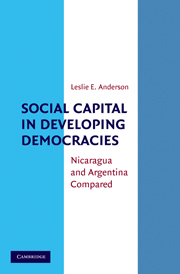Book contents
- Frontmatter
- Contents
- Preface
- 1 An Introduction
- PART I CREATING SOCIAL CAPITAL
- PART II AN EMPIRICAL EXAMINATION OF THE ARGUMENT
- 4 A Tale of Two Neighborhoods: Social Capital in Nicaragua and Argentina
- 5 Democracy and Its Competitors: Political Values in Nicaragua and Argentina
- 6 Participation, Democratic Institutions, and Procedures
- PART III MAKING DEMOCRACY WORK WITHOUT SOCIAL CAPITAL: INSTITUTIONAL CAPITAL
- 8 Conclusion
- Appendix
- Works Cited
- Index
6 - Participation, Democratic Institutions, and Procedures
Published online by Cambridge University Press: 05 June 2012
- Frontmatter
- Contents
- Preface
- 1 An Introduction
- PART I CREATING SOCIAL CAPITAL
- PART II AN EMPIRICAL EXAMINATION OF THE ARGUMENT
- 4 A Tale of Two Neighborhoods: Social Capital in Nicaragua and Argentina
- 5 Democracy and Its Competitors: Political Values in Nicaragua and Argentina
- 6 Participation, Democratic Institutions, and Procedures
- PART III MAKING DEMOCRACY WORK WITHOUT SOCIAL CAPITAL: INSTITUTIONAL CAPITAL
- 8 Conclusion
- Appendix
- Works Cited
- Index
Summary
… we do not say that a man who takes no interest in politics is a man who minds his own business; we say that he has no business here at all.
Pericles' Funeral Oration, on Athenian DemocracyPolitical institutions have moral as well as structural dimensions. A society with weak political institutions lacks the ability to curb the excesses of personal and parochial desires.
Samuel HuntingtonWe move now to take a second step in tracing the empirical connection between social capital and democracy. Since, as we saw in Chapter 5, different kinds of social capital are associated with different democratic values, what difference does that make with respect to political action and attitudes about democracy's institutions and procedures? This chapter answers those questions. It is divided into three sections: political participation, support for democratic institutions, and support for democratic procedures.
The empirical bases for this chapter are several. We begin by returning to our two neighborhood data bases: Bello Horizonte in Nicaragua and La Matanza in Argentina. Those data scrutinize the specifics of political participation and do so across party lines, as well as allowing a contrast across the two nations studied here. We then continue the analysis with national data bases drawn from the Latinobarometer study. That contrast reproduces the historical perspective used in Chapter 5. The national samples begin with the late 1990s and draw upon the Latinobarometer study for 1997. We then contrast the 1997 findings with Latinobarometer data for 2007.
- Type
- Chapter
- Information
- Social Capital in Developing DemocraciesNicaragua and Argentina Compared, pp. 172 - 198Publisher: Cambridge University PressPrint publication year: 2010



